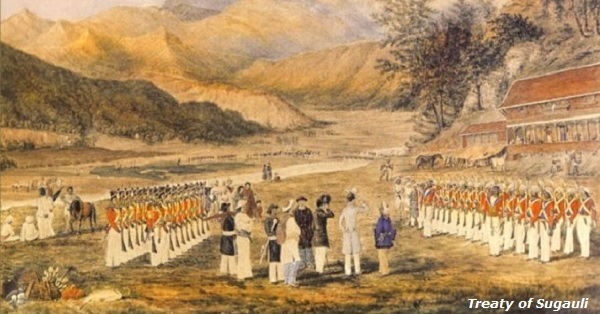
- Modern Indian History Tutorial
- Modern Indian History - Home
- Decline of Mughal Empire
- Bahadur Shah I
- Jahandar Shah
- Farrukh Siyar
- Muhammad Shah
- Nadir Shah’s Outbreak
- Ahmed Shah Abdali
- Causes of Decline of Mughal Empire
- South Indian States in 18th Century
- North Indian States in 18th Century
- Maratha Power
- Economic Conditions in 18th Century
- Social Conditions in 18th Century
- Status of Women
- Arts and Paintings
- Social Life
- The Beginnings of European Trade
- The Portuguese
- The Dutch
- The English
- East India Company (1600-1744)
- Internal Organization of Company
- Anglo-French Struggle in South India
- The British Conquest of India
- Mysore Conquest
- Lord Wellesley (1798-1805)
- Lord Hastings
- Consolidation of British Power
- Lord Dalhousie (1848-1856)
- British Administrative Policy
- British Economic Policies
- Transport and Communication
- Land Revenue Policy
- Administrative Structure
- Judicial Organization
- Social and cultural Policy
- Social and Cultural Awakening
- The Revolt of 1857
- Major Causes of 1857 Revolt
- Diffusion of 1857 Revolt
- Centers of 1857 Revolt
- Outcome of 1857 Revolt
- Criticism of 1857 Revolt
- Administrative Changes After 1858
- Provincial Administration
- Local Bodies
- Change in Army
- Public Service
- Relations with Princely States
- Administrative Policies
- Extreme Backward Social Services
- India & Her Neighbors
- Relation with Nepal
- Relation with Burma
- Relation with Afghanistan
- Relation with Tibet
- Relation with Sikkim
- Relation with Bhutan
- Economic Impact of British Rule
- Nationalist Movement (1858-1905)
- Predecessors of INC
- Indian National Congress
- INC & Reforms
- Religious & Social Reforms
- Religious Reformers
- Women’s Emancipation
- Struggle Against Caste
- Nationalist Movement (1905-1918)
- Partition of Bengal
- Indian National Congress (1905-1914)
- Muslim & Growth Communalism
- Home Rule Leagues
- Struggle for Swaraj
- Gandhi Assumes Leadership
- Jallianwalla Bagh Massacre
- Khilafat & Non-Cooperation
- Second Non-Cooperation Movement
- Civil Disobedience Movement II
- Government of India Act (1935)
- Growth of Socialist Ideas
- National Movement World War II
- Post-War Struggle
- Clement Attlee’s Declaration
- Reference & Disclaimer
Modern Indian History - Relation with Nepal
The British desire to extend their Indian Empire to its natural geographical frontier brought them into conflict, first of all, with the northern Kingdom of Nepal.
War with Nepal, 1814
The Nepal valley had been conquered in 1768 by the Gurkhas, a Western Himalayan tribe.
Gurkhas had gradually built up a powerful army and extended their sway from Bhutan in the East to the river Sutlej in the West.
From the Nepal Tarai, the Gurkha now began to push southward. In the meanwhile, the British conquered Gorakhpur in 1801. This brought the two expanding powers face to face across as ill-defined border.
In October 1814, a border clash between the border police of the two countries led to open war.
The British officials had expected an easy walk-over especially as their army attacked all along the 600 mile frontier. But the Gurkhas defended themselves with vigor and bravery. The British armies were defeated again and again.
In the long run, however, the Gurkhas could not survive. The British were far superior in men, money, and materials
In April 1815, they occupied Kumaon, and on 15th May, they forced the brilliant Gurkha Commander Amar Singh Thapa to surrender.
The Government of Nepal was now compelled for peace. But the negotiations for peace soon broke down. The Government of Nepal would not accept the British demand for the stationing of a Resident at Kathmandu, capital Nepal.
It was realized that to accept a subsidiary alliance with the British amounted to signing away Nepal's independence. Fighting was resumed early in 1816.
The British forces won important victories and reached within 50 miles of Kathmandu. In the end, the Nepal Government had to make a peace agreement (known as Treaty of Sugauli) on British terms.

Nepal Government accepted a British Resident. It ceded the districts of Garhwal and Kumaon and abandoned claims to the Tarai areas. It also withdrew from Sikkim.
The agreement held many advantages for the British such as −
Their Indian Empire now reached the Himalayas;
They gained greater facilities for trade with Central Asia;
They also obtained sites for important hill-stations such as Simla, Mussoorie, and Nainital; and
The Gurkhas gave added strength to the British-Indian army by joining it in large numbers.
The relations of the British with Nepal were quite friendly thereafter. Both parties to the War of 1814 had learnt to respect each other's fighting capacity and preferred to live at peace with each other.